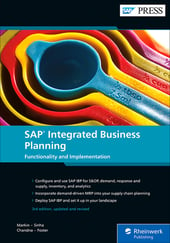Technology has truly changed how we interact, engage, communicate, buy, sell, coordinate, and collaborate with different business entities.
With ongoing innovations, and the availability of advanced tools, digital transformation has become even faster, more flexible, and more customer-focused.
Today, we are in a position to deliver optimized services that are high in quality and cost-effective too. Various businesses, especially those that deal with supply chains, are chief among those benefiting from ever-evolving technology. Some of the main benefits that supply chains receive come through the SAP Integrated Business Planning (SAP IBP) solution.
What is SAP IBP?
SAP IBP focuses on bringing inventory, sales, financial, and supply planning processes into a single, consistent, and seamless plan. It is a cloud-based solution that helps businesses effectively manage their operational and strategic goals in an integrated environment. Some of SAP IBP’s key features include:
- Collaboration across verticals in an organization.
- An exceptional, user-friendly interface.
- Real-time simulations for various business scenarios in order to meet the growing business demand, supply, and financial models of an organization.
To make such execution possible, plans are approved by executives at all levels of management, which makes it easier to align the supply and demand, execution, strategic, and tactical planning of the business.
SAP IBP plays an integral part in the broader SAP S/4HANA ecosystem. It has been specifically designed to help various businesses manage complex supply chains and streamline operations at various levels. Every module in this solution includes a standardized data model, which helps provide real-time supply chain visibility. As you know, having a real-time vision is great help when making business decisions.
The dedicated integrated planning environment of SAP IBP allows multiple users to run different simulations and perform different analysis scenarios in the planning cycles. It also makes it easy to handle any exceptions with alerts. Overall, you can say that SAP IBP management can help accelerate the planning process and decision making, as it makes use of two interfaces to optimize the user experience: a web interface for planning, and Microsoft Excel for decision making.
Where Do We Use SAP IBP?
SAP IBP is an excellent solution to the various challenges encountered in business. Let’s take a look at some of its applications.
Sales & Operations
SAP IBP for sales & operations (S&OP) is the heart of integrated business planning. It allows seamless integration of sales and operations planning in a business. Typically, it includes the steps of supply and demand review, balance, and integrations. Users can easily perform different analyses and integrations which allow them to envision and model different scenarios. It also allows stakeholders to align their long-term strategic plans with short-term operational planning to increase the supply, utilization, and timely delivery to customers.
Benefits of SAP IBP for S&OP include multiple forecasting models with the ability to stimulate demand, supply, and financial models; a comprehensive view of the complete supply network and its customers, manufacturing units, distribution units, and suppliers; and easy integration with other solutions.
Demand
SAP IBP for demand provides a precise demand plan which can be used to forecast accurately and allows for efficient execution. Its ability to calculate accurate forecasts using advanced algorithms through demand sensing is extremely helpful. A fully integrated demand planning helps in lowering the inventory cost and higher service levels.
Benefits of SAP IBP for demand include forecasting to an extent and working backward to ensure timely supply, and signaling to confirm orders and adapted the supply chain accordingly.
Inventory
SAP IBP for inventory assists in advanced inventory planning for highly complex supply chains. Planners can easily perform single, multi-level inventory optimizations as well as analysis on the basis of different scenarios. This helps in standardized inventory target settings at each level of the supply chain.
Benefits of SAP IBP for inventory include improving delivery service and reducing working capital, increasing efficiency and productivity, utilizing advanced algorithms that effectively balance inventory investment and service levels at each supply chain link, and determining where and how much inventory should be made available in different sourcing environments.
Response and Supply
SAP IBP for response and supply helps perform capacity planning and analysis on the basis of several constraints across the supply chain. It simulates planning and evaluates them on different scenarios, considering procurement, inventory, warehousing, cost of production, procurement, etc.
It takes into account demand variability and considers how to best allocate constrained resources to ensure a high level of quality service, while still keeping the cost low.
Why You Should Use SAP IBP?
SAP IBP is designed to profitably meet future demand with real-time supply chain management. Some of the main reasons why you should choose SAP IBP are outlined below.
Technology
With the help of SAP IBP, you can easily leverage a full suite of solutions that enables new business modeling, end-to-end business processes, and new revenue streams for businesses. It allows the organization to synchronize integrated planning through a vast network of interconnected solutions. With better visibility in the supply chain, the company can react faster to the changing needs of the business environment.
Enhanced Productivity
SAP IBP results in more productivity, better responsiveness, and lets businesses run more strategically. SAP IBP makes processes in supply chain management faster, smarter, and easier, with world-class recognition. It provides real-time data for quick analysis and execution.
Digital Transformation
SAP IBP offers some of the most innovative applications to provide an efficient, end-to-end demand solution. It delivers real-time data and analysis while offering peer-to-peer application and management through collaboration within the platform.
Enhanced User Experience
SAP IBP provides businesses with the ability to seamlessly integrate additional supply chain planning modules and other applications. When planning and analysis are kept all within a single portal, it automatically leads to an increased user engagement, and data becomes more reliable. This results in a faster time to value and reduces turnaround time. Companies can further benefit by integrating SAP’s other SCM solutions to create a real-time supply chain platform.
Security Features
SAP IBP makes your data secure by deploying the highest security standards and safety for the data across the web and cloud. It enhances and maintains the integrity of your data more conveniently than ever.
Conclusion
SAP IBP provides a host of benefits for those running the solution, including a complete transformation of supply chain operations and improved real-time business analysis. If you need assistance or consultation support for improving your business process, contact SCPLAN, which offers consultation support for technological solutions related to SAP.
This post was originally published 6/2022.




%20in%20SAP%20IBP_.jpg?height=600&name=What%20Is%20Characteristics-Based%20Planning%20(CBP)%20in%20SAP%20IBP_.jpg)

Comments